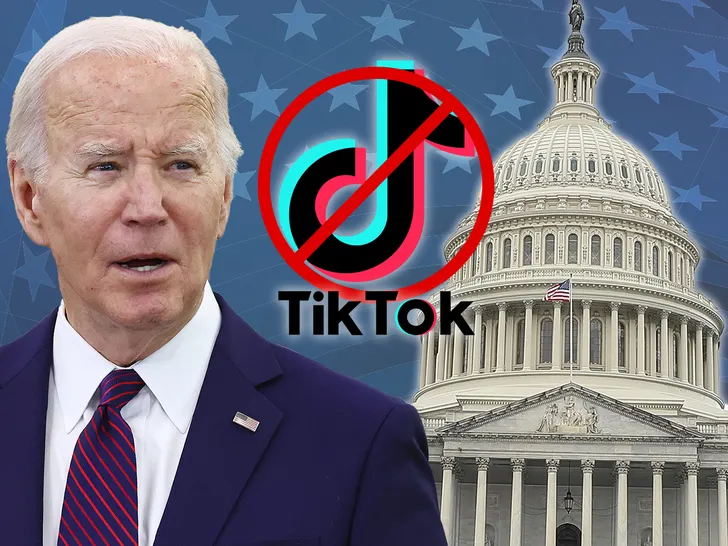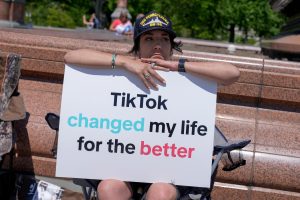- 24 April 2024
- 241
TikTok faces US ban as bill set to be signed by Biden

In recent developments, the United States Senate has passed legislation with significant ramifications for the future of TikTok, the popular short-form video app. This article delves into the intricacies of this decision, its background, implications, and the ensuing controversies.
Background Information on the Legislation
The Senate’s decision to pass legislation targeting TikTok marks a pivotal moment in the ongoing debate over national security concerns and foreign influence in social media. This move comes amidst growing apprehensions among lawmakers regarding the app’s ownership and its potential ties to the Chinese government.
Senate’s Decision and Implications
The legislation, passed with a majority vote of 79-18, underscores bipartisan fears over Chinese threats and the perceived risks posed by TikTok’s China-based parent company, ByteDance. It aims to compel ByteDance to divest its ownership of TikTok, thereby mitigating concerns regarding data privacy and national security.
President Biden’s Response
President Joe Biden has expressed his intention to sign the bill into law promptly, signaling the administration’s commitment to addressing the perceived risks associated with TikTok’s operations.
House Republicans’ Involvement
The inclusion of the TikTok bill in a broader foreign aid package, facilitated by House Republicans, expedited its passage through Congress. This strategic maneuver reflects the prioritization of national security concerns and underscores the bipartisan consensus on the need for regulatory action.
Extension of Deadline and Provisions of the Bill
The revised legislation extends the deadline for ByteDance to divest its stakes in TikTok, providing a nine-month window for compliance, with a potential three-month extension if deemed necessary. Additionally, the bill prohibits ByteDance from retaining control over TikTok’s algorithm, a pivotal component of its platform.
Concerns Over Chinese Influence
Lawmakers have voiced concerns over the potential for Chinese authorities to access American user data through TikTok or influence content dissemination on the platform. This apprehension reflects broader geopolitical tensions and underscores the imperative to safeguard national interests in the digital age.
Legislative Intent: Protecting American Interests
Chairwoman Maria Cantwell emphasizes that the legislation aims to safeguard against foreign espionage, surveillance, and malicious activities that may compromise American security and individual privacy. The focus is on preemptive measures to mitigate potential risks posed by foreign-owned platforms like TikTok.
Opposition to the Bill
Despite bipartisan support for the legislation, critics argue that alternative approaches, such as comprehensive data privacy laws, may offer a more effective means of protecting consumer interests. Concerns over potential infringements on free speech and privacy rights underscore the complexity of regulatory interventions in the digital sphere.
Privacy Concerns
Opponents highlight the need for nuanced approaches that balance national security imperatives with individual privacy rights. They contend that a blanket ban on TikTok may not adequately address underlying privacy concerns and could set a precedent for future regulatory overreach.
Free Speech Issues
Some lawmakers express reservations regarding the bill’s potential impact on free speech rights, citing the need for careful oversight to prevent unintended consequences. They stress the importance of vigilance in safeguarding constitutional liberties amidst evolving geopolitical dynamics.
Legal Challenges and TikTok’s Response
The prospect of legal challenges looms large as TikTok prepares to contest the legislation in court. Past court successes and ongoing advocacy efforts underscore the company’s commitment to defending its interests and challenging regulatory overreach.
Previous Court Successes
TikTok has a history of successfully challenging regulatory actions that impinge upon its operations, including previous attempts to ban the app on national security grounds. These legal victories demonstrate the resilience of the company’s legal team and its capacity to navigate complex regulatory landscapes.
Current Legal Strategy
TikTok intends to challenge the legislation in court, signaling its determination to resist forced divestiture and defend its business model. The company’s legal strategy will likely focus on constitutional arguments, privacy rights, and due process considerations in seeking judicial relief.
Political Climate Surrounding TikTok

The legislative debate over TikTok reflects broader geopolitical tensions and evolving dynamics in U.S.-China relations. The involvement of multiple stakeholders, including the Trump administration, underscores the multifaceted nature of the issue and the complexity of addressing national security concerns in the digital domain.
Trump Administration’s Involvement
Former President Donald Trump’s efforts to ban TikTok through executive orders underscored the administration’s concerns over Chinese influence and data security risks. However, subsequent legal challenges and regulatory negotiations have complicated the path forward, highlighting the complexities of policymaking in this arena.
Committee on Foreign Investment
The involvement of the Committee on Foreign Investment in the United States (CFIUS) underscores the national security dimensions of the TikTok debate. As a key arbiter of foreign investment, CFIUS plays a pivotal role in assessing the potential risks posed by foreign-owned entities operating in sensitive sectors of the economy.
Departure of ByteDance Attorney
Erich Andersen’s departure from ByteDance signals a shift in the company’s legal strategy and leadership dynamics. His decision to step down amidst ongoing regulatory challenges reflects the intensifying pressures facing TikTok and its parent company in navigating the legal and political landscape.
Content Creators’ Reaction
The passage of legislation targeting TikTok has sparked advocacy efforts among content creators who rely on the platform for their livelihoods. Their concerns center on the potential disruption to their income streams and the broader implications for online expression and community engagement.
Advocacy Efforts
Content creators have mobilized to raise awareness about the legislation’s potential impact on their livelihoods and the creative ecosystem fostered by TikTok. Their advocacy efforts underscore the significance of user-generated content platforms in shaping digital culture and facilitating creative expression.
Views on TikTok’s Safety Measures
Some content creators argue that TikTok’s existing safety measures, such as Project Texas, demonstrate the platform’s commitment to protecting user data and addressing regulatory concerns. They contend that targeted mitigation efforts offer a more nuanced approach to addressing privacy and security challenges without resorting to blanket bans.
Conclusion
The passage of legislation targeting TikTok reflects ongoing concerns over national security, data privacy, and foreign influence in the digital sphere. While bipartisan support underscores the urgency of addressing these issues, lingering questions remain regarding the efficacy and potential unintended consequences of regulatory interventions. As TikTok prepares to contest the legislation in court, the broader implications for online freedom and innovation remain subject to debate and legal

